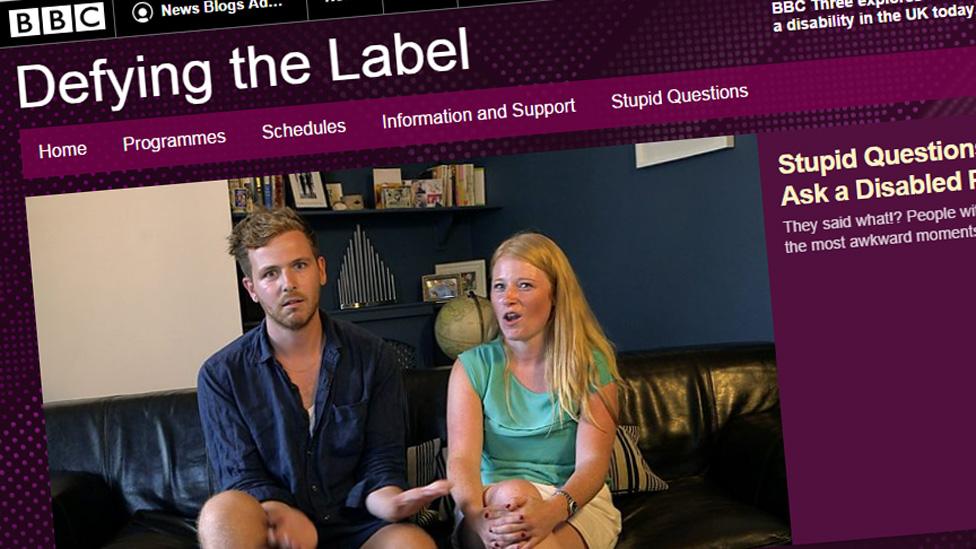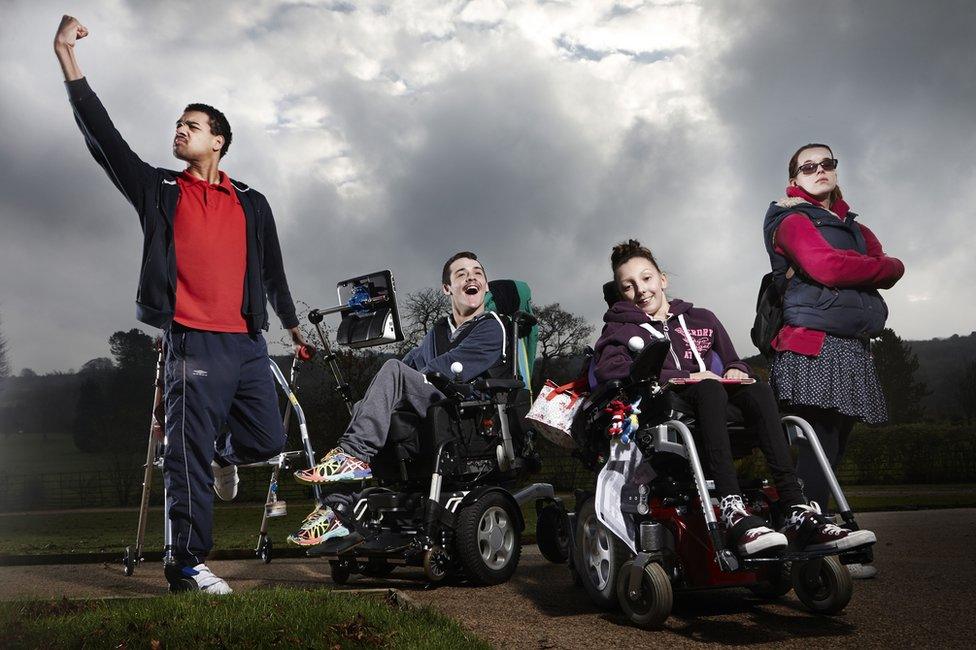Did BBC3's disability season hit the mark?
- Published

BBC Three's Defying the Label season came to an end last week. But did it hit the mark? Disabled journalist Frances Ryan thinks it did.
If you caught even part of BBC Three's Defying the Label season - the channel's biggest ever season of disability related programming - it was easy to sense the relish of the commissioning editors. Over the past month, there have been 15 specialist documentaries, current affairs features, a factual drama and a comedy panel game show that covered topics ranging from sex and relationships to hate crime. At times, it was as if BBC Three felt they were single-handedly filling in the wasteland of mainstream coverage of disability. Perhaps they were.
In my weaker moments, I would prefer a television-wide ban of every disabled person in the country than to watch another makeover programme renovate a disabled person's house or garden to a chorus of inspirational music.
In 2014, the on-screen representation of disabled people across the BBC was at - a pretty dire - 1.2%. This is an issue across all channels. And one that does not just concern how rarely disabled people are featured on television but how they are depicted when they are.
BBC Three took us to another place entirely with the Defying the Label season, showing viewers and commissioners alike how disability on television could be and it did this in two ways. On the one hand, it gave a focus to disability-related stories that are rarely given screen time. On the other, it gave control to disabled people - from presenters to documentary subjects - it seems fair to say we would otherwise not see.

Shows like The Unbreakables: Life And Love On Disability Campus - a three-part documentary following a group of young people with complex disabilities living away from home for the first time - and Wanted: A Very Personal Assistant - following young disabled people's search for suitable carers - were proof of this most obvious but often ignored rule of representation on television. As The Radio Times put it in its review, external: "The brilliance came by not trying to do anything except give the subjects the chance to speak for themselves."
The season was not always easy viewing. The Ugly Face of Disability Hate Crime took us through surely some of the worst demonstrations of daily prejudice. Brilliantly presented by Adam Pearson, it explored not only the cruelty of the crimes in the UK but the scandal of how little justice there is for the victims. The World's Worst Place to be Disabled? - a one-off documentary presented by journalist and wheelchair user, Sophie Morgan - showed the horrific impact of cultural and religious stigma around disability in Ghana. I've not often seen images like this on television - the sprawling prayer camps where disabled children and adults are kept in chains to a river where disabled babies are said to be ritually killed with schnapps laced with poison.
Adam and Lucas talk about the hurtful incidents they both faced at school
I would like to believe that such stories would have made it to the screen without the commissioning structure of a designated disability season but the evidence suggests otherwise. How often do we see a documentary on BBC Two exploring an issue specific to the disabled community? Or a drama on BBC One featuring a lead by a disabled actor? Don't Take My Baby - the season's lone disability drama - was repeated on BBC1 on Tuesday but this is a rare example, (and not in primetime).
The BBC have publicly announced a commitment to quadruple the on-screen representation of disabled people by 2017. It will be interesting to see how exactly this is achieved.
Designated seasons such as Defying the Label are an effective short-term strategy but they are not a long-term solution. Television at its best is a window into another life. What we see on screen will only become less male, white, middle-class, heterosexual - and non-disabled - when diverse programming is not a seasonal special but a regular scheduling fixture. As Scope's Mark Atkinson Mark recently noted, when it comes to disability on our screens, the focus needs be on getting disabled actors, characters and stories in all types of programming - from soaps, children's programming to reality TV.
The positive reception to the Defying The Label season - both critically in reviews and from the public on social media - can give commissioners confidence. It's shown that if you give viewers well crafted, engaging storytelling about disability, they will not only watch but stay for more. The next ambition should be telling such stories on BBC One and BBC Two, integrated into everyday programming. After all, whether it is a drama based on the fight of disabled parents to keep their children or documentaries about disability hate crime, these are not "disability programmes" but programmes that happen to feature disability. The true testament to the success of specialised disability seasons is when there will no longer be a need for them.
Did you see any of the Defying The Label season? Did you think it was a success? Email us at ouch@bbc.co.uk to let us know what you thought.
Follow @BBCOuch, external on Twitter and Facebook, external, and subscribe to our YouTube, external channel.